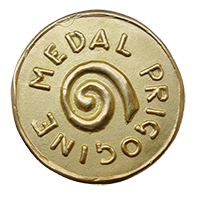 The Prigogine Award was established by the University of Siena and the Wessex Institute of Technology in 2004 to honour the memory of Professor Ilya Prigogine, Nobel Prize Winner for Chemistry.
The Prigogine Award was established by the University of Siena and the Wessex Institute of Technology in 2004 to honour the memory of Professor Ilya Prigogine, Nobel Prize Winner for Chemistry.
Ilya Prigogine
Ilya Prigogine was born in Moscow in 1917 and obtained his undergraduate and graduate education in chemistry at the Free University in Brussels. He was awarded the Nobel Prize for his contribution to non-equilibrium thermodynamics, particularly the theory of dissipative structures. The main theme of his scientific work was the role of time in the physical sciences and biology. He contributed significantly to the understanding of irreversible processes, particularly in systems far from equilibrium. The results of his work have had profound consequences for understanding biological and ecological systems.
Prigogine’s ideas established the basis for ecological systems research. The Prigogine Medal to honour his memory is awarded annually to a leading scientist in the field of ecological systems. All recipients have been deeply influenced by the work of Prigogine.
 Søren Nors Nielsen (2023 winner)
Søren Nors Nielsen (2023 winner)
Søren Nors Nielsen was born and raised in Vejle, where from early childhood he explored the beautiful surroundings together with his father, a school teacher. This undoubtedly contributed to inspire an interest in biology – an interest and concern that is not easy to ignore. After high school he continued directly to the University of Copenhagen to study biology, graduating with a thesis on estuarine ecology. This included the development of a rough model attempting to simulate the water flows and mass balances in the study area.
Shortly after graduation he came into contact with Sven Erik Jørgensen, who offered him a post on a project modelling aquacultural activities. He continued to work in similar project posts for 17 years. In one of these, he was asked to implement the newly-developed exergy function, derived for ecosystems, and immediately understood its significance for other areas of ecology - and for biology in general. These 17 years also included modelling activities in ecological engineering projects, which sharpened his views on the severe impacts of human activities on nature in general.
His PhD thesis dealt with the potential for implementing the exergy function as a pure goal function influencing ecosystem development. This was expected to make it possible to develop models that could imitate the selection and adaptation of organisms within the ecosystem – an approach which at that time was termed structural dynamic modelling. Inevitably, the publications of Schrödinger and Prigogine formed an essential part of the theoretical background for this work.
This work also led to discussions with other groups of scientists interested in discussing life, biology and ecosystems from a thermodynamic point of view. This led to studies aimed at understanding and – if possible – reconciling the many directions represented in discussions on minimum, maximum and optimum configurations of constituent components and flows, and this became a central part of his work. Recently these discussions were summarized in an award-winning review for Journal of Entropy.
Meetings with other scientists such as Donald Huisingh and Howard T. and E.P. Odum, together with early readings of Georgescu-Roegen and an increasing awareness of the inefficient use of energy and materials in human society helped to fuel the idea of analyzing human societies as ecosystems. Such analyses demonstrated how dissipations and structural behaviour in human society generally deviate from those found in nature and ecosystems, which led to the suggestion that we should learn from nature, and also to the suggestion that by aiming at an eco-mimetic development of human society we could steer it into a more sustainable direction. An attempt to describe and understand human society as an ecosystem emerged in the form of papers and a recent book on ”Sustainable Development Indicators”.
Many of the structural differences between nature and human society remain well concealed, although much has been revealed by network studies that follow Ulanowicz, Patten and their respective co-workers. It appears that human societies, with their ever-changing compositions of ”ecosystem” networks, allow for neither the potential maximization of ascendency-related measures nor for the continuous exploitation of, for instance, network synergies. The impact of disturbances is probably best studied from an approach based on viewing the system as a single communicative structure – allowing cybernetics and information flows to be combined into an ecosystem semiotics.
Teaching and learning have also formed a core of his activities, starting with freshmen’s tutorials as a student, followed by courses with Sven Erik Jørgensen on ”Systems Analysis for Biologists” - later supplemented with additional perspectives for students of pharmacology and environmental chemistry; these have been held almost 70 times in several countries. Other teaching activities include lectures in philosophy of science, physical chemistry, and – as the latest development – the post of lecturer in sustainability, biotechnology and technoanthropological at Aalborg University.
SPECIAL PRIGOGINE LECTURE
on
Formulating a sustainable management by learning from nature
delivered by Søren Nors Nielsen at the Sustainable Development and Planning Conference,
in Seville on Monday, 23 September 2024.
Summary
Environmental sciences have over the latest decades developed into a multitude of disciplines which all must be involved in shaping the proper interdisciplinary set making it possible to realize a truly sustainable society. Meanwhile, a truly constructive dialogue in the area seems to be stuck and conversations are “lost in translation”. Thus, a robust set of terms with stringent definitions needs to be formulated and, at the same time, a higher level of insight in all disciplines involved must be established among participants.
While both nature and society can be characterized as complex systems, it is hard to explain what exactly makes up the difference between the two. Here the field of modern ecosystem theory may offer a variety of methods for analyses of difference in behaviours. Comparing society with nature indicates the possibility to formulate an “eco-mimetic” development which would speed up the process of transition towards sustainability; often results can be achieved in a much cheaper manner this way. Obvious issues to compare are such like Complexity, Adaptation and Evolution/Development, States vs Processes, Organization/Hierarchy, Cycling and Regulation – primarily discussed in terms of thermodynamics. All in all, we need to combine two types of systems which are inherently indeterminate, both insufficiently described by normal laws of physics. The integration of a robust ecological understanding in management and policy presents an important way to solve this problem.
At present, we are far from a common, unified understanding of nature’s function between the ecological and sociological part of environmental sciences. First, we must agree on the physical constraints that we live under, such as finiteness of resources, thermodynamics, geological and climatic conditions. Second, a common vocabulary based in scientific knowledge, free from fluffy definitions and greenwashing must be established. This includes a change in mindset in which we learn to respect all “levels of reality”. Third, as mentioned, the systems possess a high level of indeterminacy and adjacent uncertainty that cannot be ignored, thus we need to accentuate and respect the precautionary principle. Fourth, the basic behavior between society and nature differs in terms of goals, e.g. a continuous, maximized growth vs. balanced, optimized function. Our challenge - to connect the two system worlds - is one of the core issues to be solved with respect to establish a sustainable development.
Meanwhile, the realization of the above ideas imposes new constrains on science, education, management, policy making as well as the necessary concerted actions. At the core, a common platform for understanding, describing and discussing the agencies in nature and society is necessary and might be provided by the new discipline of ecological semiotics. Next we need to establish the adequate control mechanisms by ensuring a flexible democratic praxis which allows for decentralized, common-based solutions and not insist on a ”one size fits all” based policy. This can only be realized with high level of equity and participation in both research and practice. In the end, - what is needed most is proper action.
Previous Prigogine Laureates
2004 Sven Jorgensen, Denmark
2005 Enzo Tiezzi, Italy
2006 Bernard Patten, USA
2007 Robert Ulanowicz, USA
2008 Ioannis Antoniou, Greece
2009 Emilio del Giudice, Italy
2010 Felix Müller, Germany
2011 Larissa Brizhik, Ukraine
2012 Gerald Pollack, USA
2013 Vladimir Voeikov, Russia
2014 Mae-wan Ho, UK
2015 Bai-Lian Larry Li, USA
2016 Brian Fath, USA
2017 João Carlos Marques, Portugal
2018 Stuart Kauffman, USA
2019 Luc Montagnier, Switzerland
2020 Diederik Aerts, Belgium
2021 Simone Bastianoni, Italy
2022 Robert Gilmore, USA
For further information about the Prigogine Awards, please contact:
Prigogine Award
Wessex Institute
Ashurst Lodge, Ashurst
Southampton
SO40 7AA, UK
Tel: +44 (0) 238 029 3223
Email:
See the following Web pages for details of the recent Prigogine Awards:
Further details of all Prigogine Awards can be found on our dedicated page: Prigogine Award

 Wessex Institute
Wessex Institute